Coastal research: GKSS to invest twelve million euros in a new observation system for the North Sea
With the major COSYNA project (Coastal Observation System for Northern and Arctic Seas), a comprehensive observation system is being created in the area of the German North Sea for the collection, prediction and scientific analysis of the current condition and development of the coastal sea. This project is being coordinated by the GKSS Geesthacht Research Centre.
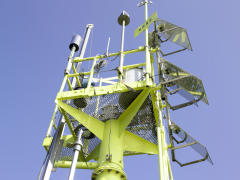
Photo: HZG/Christian Schmid
“Today’s major problems of the coasts and the seas include overfishing, overfertilisation with nutrients and the discharge of toxic substances – on top of this, there are the effects of climate change. However, we lack the scientific tools to precisely assess and predict parameters such as currents, water temperature or algae concentration“, explains Prof Franciscus Colijn, head of the Institute for Coastal Research of the GKSS Geesthacht Research Centre.
“With the comprehensive data from COSYNA, we hope to better understand the development of the system of the coastal sea as a consequence of physical, ecological and biogeochemical processes in detail and thus allow its prediction“, Colijn continues.
For the COSYNA measurement network, the Helmholtz Association is providing money in the amount of EUR 12 million. COSYNA is later to be extended to the Arctic Ocean. A national initiation workshop will be held on 15 January 2009 at the Federal Maritime and Hydrographic Agency (BSH) in Hamburg.
Observing, understanding, predicting
On the operation method of the researchers: The automated measurement systems used by the scientists, such as radar technology, measurement buoys or satellites observing the planet, establish, for instance, current conditions, salinity or oxygen levels, the temperature and motion of the sea or the concentration of algae.
This data is fed by the Geesthacht coastal researchers into complex simulation models, with the help of which the physical, ecological and biogeochemical condition of the North Sea can be derived in high temporal or spatial resolution. The first objectives of the model are short-term forecasts on the current conditions in the North Sea.
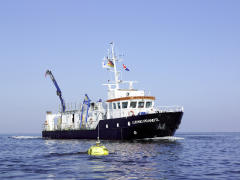
Photo: HZG/ Christian Schmid
The complex COSYNA measurement and model system improves the understanding of the North Sea as a system and thus allows well-founded analyses of the risks and options of the current climate change and use of the North Sea.
This provides the foundations for managing the coasts. Specific future research questions might include: How do the intensity and distribution of the current and motion of the sea or salt and acid levels change in the short and long term? How does a temperature rise affect the ecosystem? What controls the occurrence of algae blooms or jellyfish swarms? What zones in the Wadden Sea must be protected as a priority in the event of oil spills?
COSYNA is being developed in close coordination and cooperation with the German Marine Research Consortium (KDM) and the relevant bodies of federal and state governments. In a first step, a feasibility study will show how COSYNA can be linked with observation systems of countries with a North Sea coast in the future.
More information:
Detailed information on COSYNA can be found at:
Bildmaterial
To download a pritable version please click on the image:

The GKSS research vessel "Ludwig Prandtl" in front of a measuring buoy in the north sea. Due to its low draft the "Ludwig Prandtl" is able to operate in shallow coastal waters.
Photo: HZG/ Christian Schmid
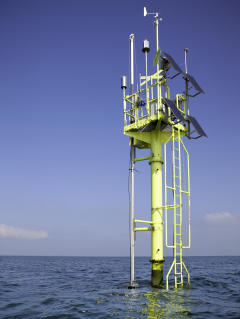
A measuring pole of the GKSS Research Centre at the german coast.
Copyright: HZG/Christian Schmid
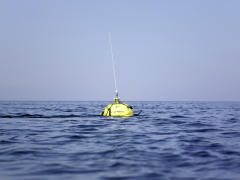
A measuring buoy of the GKSS Research Cente in the north sea.
Copyright: HZG/Christian Schmid
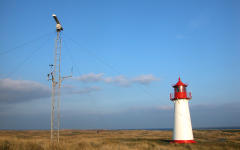
Wave radar system on the island Sylt.
Copyright: HZG/Friedwart Ziemer
